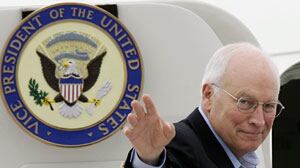From forgotten scandals to " The Last Dick," read the entire Daily Beast Farewell to Bush Chronicles.

When Richard B. Cheney exits his undisclosed location next month, he will probably be the last major figure in American life to answer to the name "Dick."
When Richard B. Cheney moves out of One Observatory Circle on January 20, it will mark the much-anticipated end to an era of man-sized safes, undisclosed locations, and vice-presidential shooting sprees. Less remarked upon is the passing of another historically significant aspect of the 67-year-old veep’s identity: his name. In all likelihood, Cheney will be the last person to occupy such an august position in American life while answering to the increasingly awkward sobriquet “Dick.”
Rick passed Dick on the baby-name list in 1947 and never looked back.
Not so long ago, every Tom and Harry seemed to be called Dick. As a diminutive of Richard, the name dated back to the Middle Ages, well before the first recorded use of the euphemism that would be its downfall. The monikers in Harold Sharp’s invaluable 1972 two-volume Handbook of Pseudonyms and Personal Nicknames include a “Dynamite Dick,” a “Galloping Dick,” and no fewer than three historical figures known as “Fighting Dick.” The latter group includes the Civil War General Israel B. Richardson, who spread carnage across a stretch of Antietam battlefield that came to be known as “Bloody Lane.” Mock his name at your peril.
In the 20th century, Dicks were everywhere. It was a solid, wholesome name for the heyday of the American era: On the football field (Dick Butkus), in detective comics (Dick Tracy), and even in the sort of boundary-pressing comedy that might have mocked anatomical double-entendres (Dick Smothers). Statistics on nicknames are hard to find, since the terms don’t appear on birth certificates, but Dick itself was among the top 200 baby names in the country through 1945 as recorded by the Social Security Administration, topping out at 138. In 1941, the year of Cheney’s birth, it was No. 171. (Richard was No. 5.)
Dick remained in the top 1,000 through 1968—perhaps coincidentally, the year Richard Nixon’s election made him the first Dick to move into the White House. By that point, of course, the nickname had bigger problems. As anyone who’s ever shared an elementary-school playground with someone named Richard can attest, Dick has a certain comedic association—one that, at least as far as 8-year-old boys are concerned, is very funny. “Especially now, any name that gains a sexual connotation is going to definitely be problematic,” says Frank Nuessel, a University of Louisville professor and the editor of Names: A Journal of Onomastics.
A little schoolyard teasing couldn’t sway the stolid, grown-up Dicks of Nixon’s generation. But baby boomers apparently had a weaker constitution. Rick passed Dick on the baby-name list in 1947 and never looked back. By 1996, when the 30,000 entries in Teresa Norman’s A World of Baby Names included Rich, Richie, Rick, Rickie, and Ricky, Dick was nowhere to be found. According to Cleveland Evans, the past president of the American Name Society, the name had suffered the same fate as Fanny, which was once a perfectly normal nickname for Frances. “It didn’t mean buttocks in American English until after World War I,” Evans says. “It was something that the doughboys brought back with them.”
Dick's lower-case, lower-abdominal second meaning has been around for while. According to the Oxford English Dictionary, it dates to the late 19th century—before the word was used for detectives, but after it had already been employed as a synonym for a certain fancy sort of riding whip. No one knows why it wasn’t Chuck or Hank or Jack that attached its name to that particular piece of the male body. But as dirty-word prohibitions loosened over the 20th century, more and more people began to hear the word and think of something other than, say, NBC executive Dick Ebersol. Slang dictionaries show a progression of other negative connotations for the word, which was used to connote an incompetent or a bully. Newly abusive conjunctions also came into fashion, as the word became attached to -head, -brain, and -nose, the latter of which the OED helpfully informs us first cropped up in 1974, the year Tricky Dick and his own ski-slope nose left Washington for good. In 1999, the word broke into prime-time television when an Ally McBeal character was referred to as a “big dick.” It wasn’t a physical description.
No wonder, then, that as the Dicks of Cheney’s generation—Gephardt, Armey—have preceded him into retirement, younger folks have eschewed the term. The sportscaster Eisen goes by Rich. The Texas governor Perry is Rick. The comedian Gervais is Ricky. Even the full name Richard has taken a tumble, falling to only the 99th most popular male name in 2007, behind Cooper, Antonio, and Kaden. I suspect Cheney would frown on such newfangled appellations: so weak, so flimsy, so post-Watergate! By Cheney’s logic, the prissy standards of modern America shouldn’t force someone to forgo torture, or to let congressional meddlers butt in on war planning, or even to disclose how many people work in the vice president’s office. And they certainly shouldn’t make people give up on an all-American, manly nickname, either. No, sir.
Of course, Dick may just get a reprieve. The president-elect’s closest Republican friend, Indiana Senator Richard Lugar, is known as Dick. So is another Obama pal, Clinton Richard Holbrooke. I hope neither one gets a job in the administration. Keeping the name in the headlines for the next few years would feel sort of anticlimactic. Plus, neither man really lives up to the name in all of its privileged, midcentury essence: Lugar seems too much of a nice guy; Holbrooke, with his star turn mediating shades of gray in the Balkans, seems too modern. Cheney, on the other hand, is all that we could want for an already anachronistic moniker’s last turn in the spotlight: so bald, so taciturn, such a…well, you know. Goodbye, Mr. Vice President. You did your name proud.
Michael Schaffer is a writer in Philadelphia. One Nation Under Dog, his book about petmania, the pet industry, and what modern petkeeping says about modern America, will be published by Henry Holt in April.






